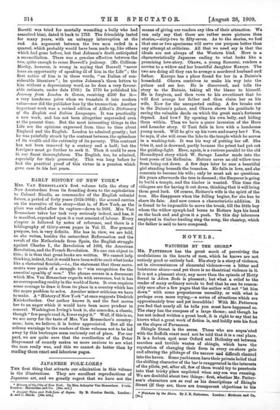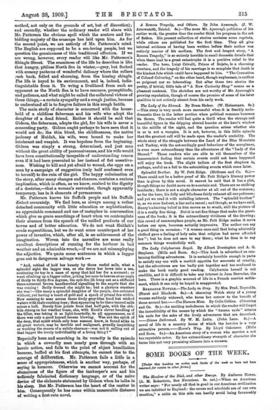NOVELS.
WATCHERS BY Ilia SHORE.* MB. PANTERSON has the great merit of perceiving the modulations in the hearts of men, which he knows are not entirely good or entirely bad. His story is a story of violence, set in circumstances of elemental violence—on a bitter and boisterous shore—and yet there is no theatrical violence in it. It is not a pleasant story, any more than the episode of Hetty Sorrel in Adam Bede is pleasant ; but what a relief to the reader of many ordinary novels to feel that he can be reason- ably sure after a few pages that the author will not "let him down" with some preposterous unreality, or with what is perhaps even more trying,—a series of situations which are approximately true and yet incredible I With Mr. Patterson you feel that nearly all he tells you must have happened so. The story has the compass of a large theme; and though he has not indeed written a great book, it is right to say that he knows what a great work of fiction is, and boldly sets his foot on the slopes of Parnassus.
Shingle Street is the scene. Those who are acquented with the Suffolk coast need not be told that it is a real place. It is a forlorn spot near Orford and Hollesley set between marshes and terrible wastes of shingle, which have the reputation of changing their form in every on-shore gale and altering the pilotage of the narrow and difficult channel into the haven. Some yachtsmen have their private belief that the shifting character of the bar is exaggerated in the interests of the pilots, yet, after all, few of them would try to penetrate into that tricky place unpiloted when any sea was running. We are doubtful about two things : first, whether Mr. Patter- son's characters are as real as his descriptions of Shingle Street (if they are, there are transparent objections to his • Watchers by the Shot,. By J. E. Patterson. London : Methuen and Co. Paa method, not only on the grounds of art, but of discretion); and secondly, whether the ordinary reader will share with Mr. Patterson the obvious spell which the austere and for- bidding majesty of the seascape has laid upon him. As for the second 'point, we are entirely of Mr. Patterson's mind. The English are supposed to be a sea-loving people, but we question the genuineness of this traditional affection. If we are wrong, however, every reader will like Mr. Pattenaon's Shingle Street. The seaminess of the life he describes is like that hungry, pitiless North Sea in winter,—grey, but flecked with creamy patterns of wonderful delicacy where the rollers rush back, felled and churning, from the hissing shingle. The life is keyed to its environment., and is, indeed, indis- tinguishable from it. To wring a livelihood from such an opponent as the North Sea is to have resource, promptitude, and patience, and what might be called the collateral virtues of these thin gs,—a certain sympathy and a rough justice, because to understand all is to forgive failure in this rough battle.
The main study of character is concerned with the house- hold of a childless fisherman and his wife who adopt the daughter of a dead friend. Rather it should be said that Gideon, the fisherman, adopts the girl, for his wife is never a consenting party. Gideon ought perhaps to have seen that it would not do; the thin blood, the childlessness, the native jealousy of Huidah, his wife, were bound to make her intolerant and waspish. It was hopeless from the beginning. Gideon was simply a strong, determined, and just man without the great ability of persuasiveness, and his wife would have been constitutionally incapable- of understanding reason even if it had been presented to her instead of flat assertive- ness. Wishing to kill and yet afraid to wound, she eggs on a man by a campaign of suggestion (only half confessed even to herself) to the ruin of the girl. The happy culmination of the story, after many changes and chances, contains a curious implication, which is often, as we know, exalted to the dignity of a doctrine,—that a woman's surrender, though apparently temporary, has in it elements of permanence.
Mr. Patterson knows his Suffolk people and his Suffolk dialect accurately. We find here, as always among a rather detached community with little education or sophistication, an appreciable command and use of metaphor in conversation which give us grave searchings of heart when we contemplate their absence from the speech of the unified products of our towns and of better education. We do not want Huldah's crude superstitions, but we do want some counterpart of her power of invective, which, after all, is an achievement of the imagination. Woven into the narrative are some really excellent descriptions of running for the harbour in bad weather and an admirable wreck,—if we are not misemploying the adjective. We quote some sentences in which a lugger goes out to dangerous salvage work
;- "And, robbed of half her beauty by those reefed sails, what a splendid sight the lugger was, as she drove her bows into a sea, scattering its top in a MESE of spray that hid her for a moment ; or went climbing up a bigger roller, poking her nose to heaven at an angle of thirty to thirty-five degrees, the spit-fire jib hung out as a stiffened three-cornered brown handkerchief signalling to the angels that she was coming ! Badly dressed she might be ; but a glorious creature she was !—like many a splendid daughter of the people, dun-coloured without, yet having a heart of gold and a spark of primal fire within. Now seeming to soar across those lively grey-blue hued but wicked waters with theircombing tops ; then appearing to be three tanned sails minus a hull. Barely four points from that half-gale, with the ebb. tide strong on her weather beam, she with Knut's clever handling of the tiller, was taking it as light-he;rtedly, to all appearances, as if there was only a good topsail breeze blowing. Was not the spirit of the deep, that spirit which only true seamen know, is found alike in all great waters, may be terrible and malignant, grandly inspiriting or working the snares of a subtle charmer—was not it calling out of that lugger the lovely individuality of a living thing ? "
Especially keen and searching in its veracity is the episode in which a cowardly man nearly goes through with an heroic action, and fails to the point of abject humiliation because, baffled at his first attempts, lie cannot rise to the courage of deliberation. Mr. Patterson fails a little in a sense of appropriateness, which is another way, perhaps, of saying in humour. Otherwise we cannot account for the clumsiness of the figure of the innkeeper's son and his tediously fabricated dictionary language, or of the naive device of the elaborate statement by Gideon when he talks in his sleep. But Mr. Patterson has the heart of the matter in him. Consequently he has come within measurable distance of writing a first-rate novel.







































 Previous page
Previous page